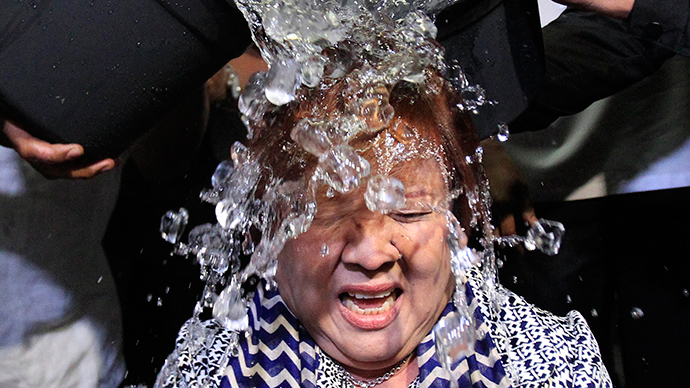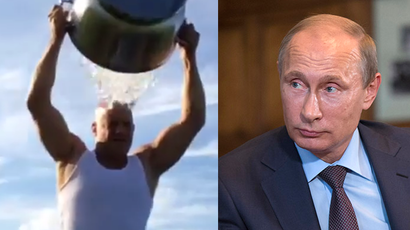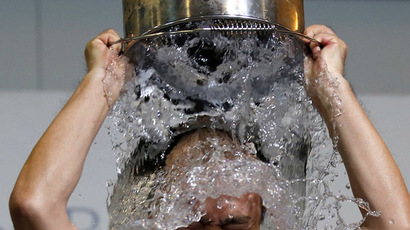#IceBucketChallenge leaves Scottish island without water, highlighting worldwide scarcity problem

With the Ice Bucket Challenge going viral worldwide, water scarcity has also come under the spotlight even in water abundant places such as Scotland, where a whole island was cut off from the water supply over the hashtag activism craze.
The so-called Ice Bucket Challenge launched in order to raise awareness for Amyotrophic Lateral Sclerosis (ALS) has reached gigantic proportions across the social media sphere as friends nominate each other to a freezing dare. Once challenged, the person has 24 hours to complete the task or donate cash, if they chicken out.
Unfortunately, the amount of clean water that is being used to help those with ALS is decimating water supplies, as the recent example of Colonsay Island in Scotland shows.

Scottish Water confirmed the switch off to water supply caused by the surge of the ASL challenge, highlighting that there was no shortage of water.
“This does not impact water supply to customers, however, an operative does then need to go to the works and power it back up again,” the statement reads.
While ASL social media advocacy is helping raised much needed funds for research of the incurable disease, with many celebrities participating in the challenge, critics say such hashtag activism just wastes water.
“This is, quite frankly, an insult to the parts of the world that have little or no drinking water readily available,” columnist Noah Frank said in a post on WTOP.com. “Hashtag activism is not real activism.”
Being that 1% who hasn't done the ALS Ice bucket challenge And refuses because it's a waste of perfectly clean water
— Abbie Neill (@Cxn_t) August 27, 2014
Furthermore, most people who take the Ice Bucket challenge are still ignorant of the ALS and the suffering it brings to its patients.
“Well a poll we carried out showed that 98% of people taking the challenge still don’t know what ALS is, so it’s obviously failed. People are not thinking about the consequences... Every time you see someone wasting water like this, you should remind them that they may be causing severe harm to hundreds of African children,” Hamish McDoodles from the World Health Organisation told the thedailyskid.com. “This was all OK for a little joke but now it’s got out of hand,” he added.
Some activists, like the Hollywood actor Matt Damon, are choosing other ways to raise ALS awareness around the globe. The Jason Bourne character is taking a practical solution to the challenge, by dumping toilet water on his head. As a co-founder of Water.org, Damon uses statistical data compiled by the NGO, to place the ice challenge in perspective.
There are 800 million people in the world who don't have access to clean drinking water, Damon says and 2.4 billion people without adequate sanitation.
“Keep in mind,” he says, “that the water in our toilets in the West is actually cleaner than the water that most people in the developing world have access to.”
According to Water.org some 3.4 million people world-wide die annually from water-related diseases, including a child every 21 seconds.
Places with water shortages are using alternative means to raise ALS awareness. In India where millions are suffering from the lack of sanitation and clean water the ice bucket challenge is being replaced by the rice bucket challenge – which actually urges people to donate a bucket of cooked or uncooked rice to a needy person.
And in Gaza, for instance, where water is in limited supply following the Israeli military operation, people are using sand from the debris from destroyed houses to raise – through the rubble bucket challenge – both ALS awareness and to highlight the suffering of Palestinians affected by Israel’s assault.
Or as RT's Sean Thomas puts it “the cause is more important than the spectacle,” as he too tries to raise awareness for both ALS and drought condition in the word.
As of Wednesday the ALS Association received $94.3 million in donations (from July 29 to August 27) compared to $2.7 million during the same time period last year. In addition the association attracted 2.1 million new donors.
Amyotrophic Lateral Sclerosis is a progressive neurodegenerative disease that affects nerve cells in the brain and the spinal cord. The progressive degeneration of the motor neurons in ALS eventually leads to their death. When the motor neurons die, the ability of the brain to initiate and control muscle movement is lost and in later stages of the disease victims may become totally paralyzed.














